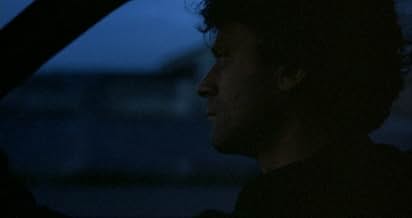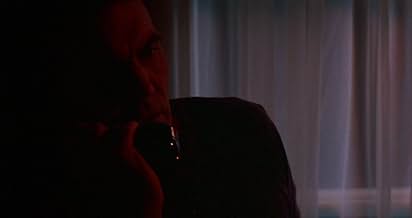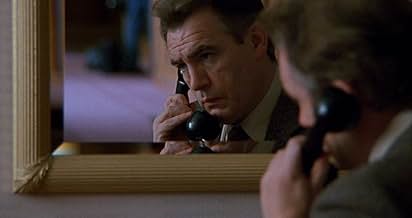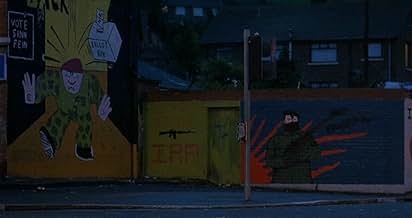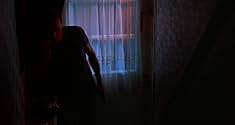PUNTUACIÓN EN IMDb
6,9/10
5 mil
TU PUNTUACIÓN
Un abogado estadounidense de derechos humanos es asesinado. Su novia y un detective de policía deben encontrar la verdad.Un abogado estadounidense de derechos humanos es asesinado. Su novia y un detective de policía deben encontrar la verdad.Un abogado estadounidense de derechos humanos es asesinado. Su novia y un detective de policía deben encontrar la verdad.
- Premios
- 2 premios y 3 nominaciones en total
Reseñas destacadas
I admit it - I'm smitten with Frances McDormand. She makes every male lead she plays opposite better by her presence. Doubt that? Look at how she elevated Brad Pitt's game in "Burn After Reading."
The rest of the acting and direction is noteworthy as well. Now about the writing.... Am I getting old, or is it really quite opaque?
The rest of the acting and direction is noteworthy as well. Now about the writing.... Am I getting old, or is it really quite opaque?
Ken Loach has made a career out of directing movies about politically charged topics. A lot of his movies have addressed class issues in the United Kingdom, but he has also looked at foreign policy. One example is "Hidden Agenda", about an investigation into the murder of a human rights lawyer in Belfast. Loach not only indicts the British occupation, but also finds time to take a swipe at Margaret Thatcher's government.* While I was watching the movie I assumed that it was based on the murder of solicitor Pat Finucane. It turns out that the movie is a fictional story, but it still makes sure to show the sorts of things that had become commonplace in Northern Ireland. I read that Loach had the cast members meet with people who had gotten abused by British forces to give them an idea of what the movie was dealing with.
Ken Loach also looked at Ireland in "The Wind that Shakes the Barley", about Ireland's war for independence in the early 20th century. Both movies take unflinching looks at what the English did to the Irish for over 800 years. To be certain, "Hidden Agenda" features a scene that should give people pause in the era of the so called war on terrorism: a man sings a song that has the line "you take our land and call us terrorists for resisting". I recommend the movie. Other movies focusing on Northern Ireland that I recommend are "In the Name of the Father", "Bloody Sunday" and "Breakfast on Pluto".
*After Thatcher died, Loach proposed that her funeral should be privatized, since she would've wanted it that way.
Ken Loach also looked at Ireland in "The Wind that Shakes the Barley", about Ireland's war for independence in the early 20th century. Both movies take unflinching looks at what the English did to the Irish for over 800 years. To be certain, "Hidden Agenda" features a scene that should give people pause in the era of the so called war on terrorism: a man sings a song that has the line "you take our land and call us terrorists for resisting". I recommend the movie. Other movies focusing on Northern Ireland that I recommend are "In the Name of the Father", "Bloody Sunday" and "Breakfast on Pluto".
*After Thatcher died, Loach proposed that her funeral should be privatized, since she would've wanted it that way.
The distinctly pedestrian and realist style to this little caper was quite refreshing as it avoided most clichés of the thriller genre like sexy protagonists and high energy gun battles etc etc to give something a little like a racy cigarette smoke-filled real-life documentary. The miry setting, in the midst of the sectarian wars of Ireland, and including within the tawdry bowels of the Royal Ulster Constabulary, also Republican bars, minor hotels, and humble households was most intriguing, but then the 'hidden agenda' plot panned away some distance from the psycho-realism onto a rather disappointing vein about incredulous or just uninteresting high level parliamentary dirty tricks, ho hum... Thatcher (of course), well not her exactly, anyway... It felt great in the main though, in the unique way the drama was directed, somewhat over the shoulder camera positions where the context is always in view, and conjuring easy naturalistic performances - with Cox doing a great turn as kind of big Yorkshire terrier. The story muddled its way along in a way that felt pretty convincing as a slice of real life in all its convolutions and routine failures of trust, up until the final segment which as I say pulled back I feel a little far, with its ambition to be a big Political thriller, somewhat betraying the best bit, the human narrative of the everyday fog of war and enduring terror that was no doubt an everyday reality for the citizens of northern Ireland.
Whooaa! Slow down, sol1218 from Brooklyn NY.
The political scene in the U.K. looked like this: Edward Heath, bachelor leader of the Conservatives, won the election in 1970. He took Britain into the then Common Market in 1973, but called an election in February 1974 when the miners forced him to declare a three-day week.
The Tory slogan for the election was: Who governs Britain? The result was confused, but the message was fairly clear: Not you, matey. Labour under Harold Wilson took office with a slim majority. Wilson called a second election in October, which he won narrowly, increasing his majority slightly.
He held a referendum on the Common Market in 1975, which he won by sidelining the extremists of both Left and Right. He ruled until 1976 when he resigned from politics, for reasons which were obscure at the time, but probably because he had been diagnosed with Parkinson's. It is certainly true that the Right plotted endlessly against him.
Jim Callaghan, who had been Chancellor, Home Secretary and Foreign Secretary, took over as P.M. and called an election after his full five-year term. (In the U.K. governments normally call elections after four years.) In fact Callaghan was forced to do so because of a move by the Scottish Nationalists. Had he called the election just a year earlier, he stood a good chance of winning, say many pundits.
Meanwhile, the Conservatives had deposed Edward Heath who had lost them two elections, and Maggie Thatcher replaced him as leader. She swept to power in 1979, and as we all know, won the next two elections.
Economic chaos was the watchword of the day and there were many strikes. The situation in Northern Ireland, which had started simmering with the Civil Rights movement of 1968, gradually deteriorated. The assassinated politician of the film whose name is Nevin, may well represent Airey Neave, a war hero who had escaped from the high-security Colditz Castle, a German-speaking lawyer who had attended the Nuremberg Trials and a hardline Conservative with military and security connections, who was a close adviser of Thatcher. He was blown up outside the House of Commons on March 30, 1979, by the INLA a few weeks before the election.
Ken Loach has never made any secret of his sympathies for the Irish cause. His powerful film "Wind that shakes the barley", which apparently did not make much money in the U.K., had Conservative politicians fulminating about treason and lack of patriotism because of his portrayal of the brutal Black and Tans. The name was given to the ex-British army personnel and (inaccurately) also to the auxiliaries who were sent to Ireland between 1920 and 1921 to crush the IRA and Sinn Fein, but who also attacked and killed civilians. Historians agree, however, that Loach was pretty accurate in his historical recreation. The film also shows the ruthlessness of Irish-on-Irish killings in the Civil War afterwards.
The political scene in the U.K. looked like this: Edward Heath, bachelor leader of the Conservatives, won the election in 1970. He took Britain into the then Common Market in 1973, but called an election in February 1974 when the miners forced him to declare a three-day week.
The Tory slogan for the election was: Who governs Britain? The result was confused, but the message was fairly clear: Not you, matey. Labour under Harold Wilson took office with a slim majority. Wilson called a second election in October, which he won narrowly, increasing his majority slightly.
He held a referendum on the Common Market in 1975, which he won by sidelining the extremists of both Left and Right. He ruled until 1976 when he resigned from politics, for reasons which were obscure at the time, but probably because he had been diagnosed with Parkinson's. It is certainly true that the Right plotted endlessly against him.
Jim Callaghan, who had been Chancellor, Home Secretary and Foreign Secretary, took over as P.M. and called an election after his full five-year term. (In the U.K. governments normally call elections after four years.) In fact Callaghan was forced to do so because of a move by the Scottish Nationalists. Had he called the election just a year earlier, he stood a good chance of winning, say many pundits.
Meanwhile, the Conservatives had deposed Edward Heath who had lost them two elections, and Maggie Thatcher replaced him as leader. She swept to power in 1979, and as we all know, won the next two elections.
Economic chaos was the watchword of the day and there were many strikes. The situation in Northern Ireland, which had started simmering with the Civil Rights movement of 1968, gradually deteriorated. The assassinated politician of the film whose name is Nevin, may well represent Airey Neave, a war hero who had escaped from the high-security Colditz Castle, a German-speaking lawyer who had attended the Nuremberg Trials and a hardline Conservative with military and security connections, who was a close adviser of Thatcher. He was blown up outside the House of Commons on March 30, 1979, by the INLA a few weeks before the election.
Ken Loach has never made any secret of his sympathies for the Irish cause. His powerful film "Wind that shakes the barley", which apparently did not make much money in the U.K., had Conservative politicians fulminating about treason and lack of patriotism because of his portrayal of the brutal Black and Tans. The name was given to the ex-British army personnel and (inaccurately) also to the auxiliaries who were sent to Ireland between 1920 and 1921 to crush the IRA and Sinn Fein, but who also attacked and killed civilians. Historians agree, however, that Loach was pretty accurate in his historical recreation. The film also shows the ruthlessness of Irish-on-Irish killings in the Civil War afterwards.
Not top-drawer Ken Loach; the "thriller" elements are well-done, but the warmth and depth Loach brings to his working-class stories has no place here. There's a structural flaw in the script, too--it presents itself as a film about Northern Ireland but then jumps headlong into something equally involving but quite different.
It is, all the same, a well-crafted, atmospheric film that never lacks excitement and raises some substantial issues. More importantly, the entire film is sadly prescient. The opening torture narratives could have been translated from accounts of Abu Ghraib prison. Change a couple of proper names and the scenery, and this would be the best film around on the U.S. occupation of Iraq. Even the second half of the story (no spoiler warning, so I give no details) rings truer and truer as time goes by.
Richly deserves reissue.
It is, all the same, a well-crafted, atmospheric film that never lacks excitement and raises some substantial issues. More importantly, the entire film is sadly prescient. The opening torture narratives could have been translated from accounts of Abu Ghraib prison. Change a couple of proper names and the scenery, and this would be the best film around on the U.S. occupation of Iraq. Even the second half of the story (no spoiler warning, so I give no details) rings truer and truer as time goes by.
Richly deserves reissue.
¿Sabías que...?
- CuriosidadesThe 'Six Irishmen,' mentioned by Sir Robert Neil of MI5 (with politician Alec Nevin) to Kerrigan is in reference to the 'Birmingham Six.' In 1974 the pub Tavern In The Town and Mulberry Bush, in Birmingham England, was bombed, killing 21 persons and injuring 182 people. The police picked up the nearest six Irishmen and subjected them to 'in-depth interrogation' to obtain false confessions. Patrick Hill, Gerard Hunter, Richard McIlkenny, William Power, John Walker and Hugh Callaghan all served 16 horrific years in jail until the convictions were overturned in 1991. Hugh Callaghan details his ordeal in the book, *Cruel Fate,* co-authored with Sally Mulready in 1994-1995. The movie En el nombre del padre (1993), was based on the Guildford Four, who were similarly jailed using false confessions, along with members of their extended family living in London. That's how the Brits induced Gerry Conlon, Daniel Day-Lewis' character, to confess, by throwing his father, aunts, uncles, and cousins in jail, too. Members of the Guildford Four ordeal were released in 1989 and 1991, where illegal police tactics and hidden evidence were brought to light. The appeals trials of the Guildford Four paved the way for the release of the Birmingham Six, who were in jail longer, and their pleas for appeals were ignored, and never heard until after the Guildford Four / Conlon Family convictions were finally thrown out. All of the innocent Birmingham Six and Guildford Four were still in jail at the time this movie was released.
- Citas
Sir Robert Neil: You know Ireland can be a wonderful place... if it wasn't for the Irish!
- Banda sonoraJoe McDonnell
Written by Brian Warfield
Re-arranged by Ron Kavana
Performed by Ron Kavana and Terry Woods
Published by Skin Music
Selecciones populares
Inicia sesión para calificar y añadir a tu lista para recibir recomendaciones personalizadas
- How long is Hidden Agenda?Con tecnología de Alexa
Detalles
Taquilla
- Recaudación en Estados Unidos y Canadá
- 1.030.938 US$
- Fin de semana de estreno en EE. UU. y Canadá
- 49.827 US$
- 25 nov 1990
- Recaudación en todo el mundo
- 1.232.210 US$
- Duración
- 1h 48min(108 min)
- Color
- Mezcla de sonido
- Relación de aspecto
- 1.85 : 1
Contribuir a esta página
Sugerir un cambio o añadir el contenido que falta


